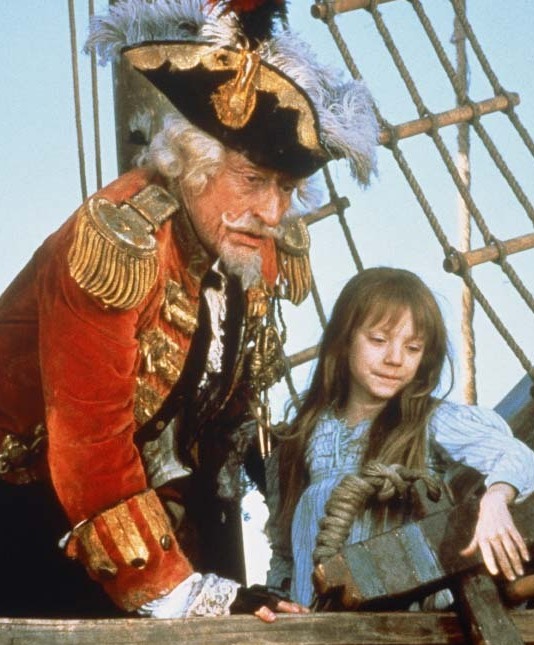Friday, March 24, 1989
THE ADVENTURES OF BARON MUNCHAUSEN. Co-written by Charles McKeown; based on Rudolf Erich Raspe's Baron Munchausen's Narrative of His Marvelous Travels and Campaigns in Russia (1785). Music by Michael Kamen. Co-written and directed by Terry Gilliam. Running time: 125 minutes. Mature entertainment with the B.C. Classifier's warning: some violence.
AMIDST THE RUBBLE OF a bombed-out theatre, an old man lies waiting. Between him and Darkness stands an intense, insistent child.
“Go away!” orders Karl Friedrich Hieronymus, the Baron von Munchausen (John Neville). “I am trying to die.”
“Why?" demands Sally Salt (Sarah Polley), the 10-year-old daughter of travelling players.
“Because I'm tired of the world,” whines the noble-nosed noble. “And the world is tired of me.”
Amidst the rubbish that so often passes for imagination in the movies, there is one visionary who never fails us. Terry Gilliam, late of the the Monty Python troupe, is a screen fantasist of the first order.
I'd call him a “genius” but for the fact that the word, like “star” and “love,” has become debased from overuse and much misuse.
Besides, the man who conceived of the Time Bandits (1981) and fought the battle of Brazil (1986) has no such pretensions.
In 1983, Gilliam recalls, he was “invited to be included in The Who's Who of Intellectuals.
“Unfortunately, I can't complete the form.”
No matter. Gilliam's form is film, and with The Adventures of Baron Munchausen he again demonstrates his mastery over it.
Here, he takes his inspiration from Rudolf Erich Raspe's classic Baron Munchausen's Narrative of His Marvelous Travels and Campaigns in Russia. Published in 1785, it was based on the tall tales spun by an old soldier who became his century's most celebrated fabulist.
Gilliam's version begins with an elderly Munchausen taking umbrage at an irreverent stage play recreating his exploits. “Lies! Lies!” he calls from the audience.
His surprise appearance is an irrelevancy to all but Sally, who believes him capable of all he claims.
Can he raise the cruel enemy siege that is slowly destroying their city? For her sake, the gallant Baron will try.
Fashioning a balloon from ladies’ bloomers, he sets off on a quest seeking his allies of old, a group that includes the world’s strongest man, Albrecht (Winston Dennis), its fastest runner, Berthold (Eric Idle), best marksman, Adolphus (Charles McKeown) and the sensitively eared Gustavus (Jack Purvis).
“He won't get far on hot air and fantasy,” sniffs the Right Ordinary Horatio Jackson (Jonathan Pryce), an initiative-stifling politician.
Designed to complete his mythic trilogy, Gilliam's Munchausen shows just how far superior fantasy can carry a heroic citizen.
Though a less dazzling performance than Brazil, it's a picture filled with the richly evocative imagery and unexpectedly immediate satire that informs the Minnesota-born film artist's style.
Rejuvenated by the faith of his new child companion, the Baron journeys to the earth's core, the sea's bottom and the moon's surface.
Along the way, they encounter the gods Vulcan (Oliver Reed) and Venus (Uma Thurman), a ship-swallowing fish, and the lunar king (Robin Williams).
The work of an instinctive movie genius — oops, there's that word — The Adventures of Baron Munchausen is first-class family fare that will also delight fancifully-minded intellectuals.
The above is a restored version of a Province review by Michael Walsh originally published in 1988. For additional information on this archived material, please visit my FAQ.
Afterword: She’s always seemed older. My notes told me that Baron Munchausen’s travelling companion Sally Salt is a 10-year-old; the record indicates that the actress playng the role was just eight at the time of filming. By that time, Toronto-born Sarah Polley was already a pro, with four previous feature films and the title role in successful television series — Ramona (1988-89) — to her credit. Born to the acting profession, she added social activism to her resume at the age of 12. In 1991, she wore a peace symbol protesting the Gulf War to an awards ceremony in Washington. Told by her Disney Studio bosses to remove it, she refused, an act of defiance that marked her as “difficult,” something no actress with Hollywood ambitions is supposed to be.
It also set her out as intelligent and mature, a young woman with a larger world view than most of her peers. She continued her involvement with both politics and performing, becoming a creative force in Canada’s film and television industry. In 2006, at the age of 27, she directed her first feature film. Away from Her, her adaptation of Canadian Nobel prize-winner Alice Munro’s short story The Bear Came Over the Mountain, won Polley two Genie Awards (for her writing and direction) and an Oscar nomination for her screenplay. At 34, she was made an officer of the Order of Canada.
Hers is a story in progress. It's one in tune with the re-emergence of a dynamic feminism. Among her recent achievements is writing and producing the 2017 TV mini-series Alias Grace. Directed by Mary (The Notorious Bette Page) Herron, it is an adaptation of Margaret Atwood’s 1996 novel inspired by the life of a woman convicted of murder in the 1843 Canada West colony. Nominated for eight Canadian Screen Awards, it won four, including best direction (Herron), actress (Sarah Gadon, in the title role), screenplay and production (both to Polley). Forty years old today (January 8), Sarah Polley has much to say and do going forward.
See also: Sarah Polley feature films in the Reeling Back archive include 1985’s One Magic Christmas and Babar: The Movie (1989);
Other movies directed by Terry Gilliam are Time Bandits (1981); Monty Python’s The Meaning of Life (1983); and Brazil (1985).
